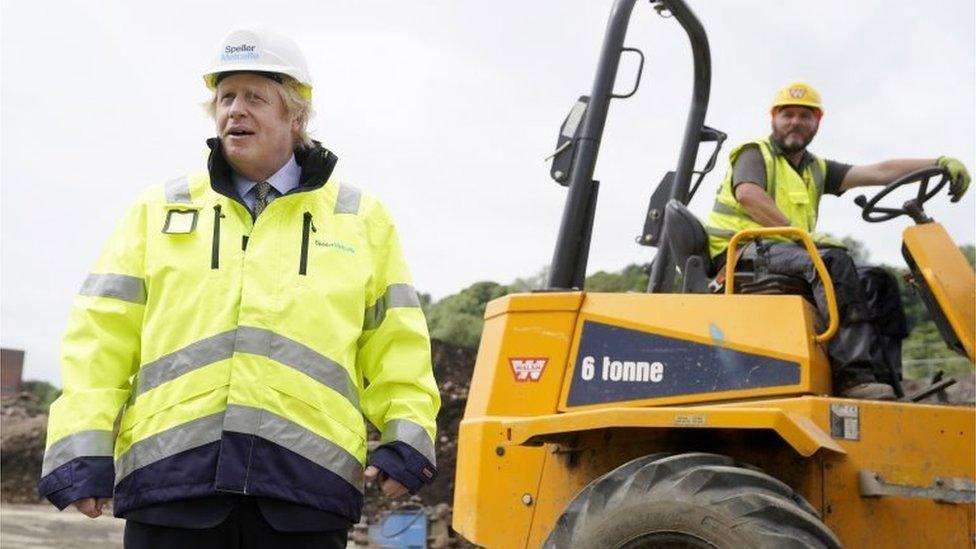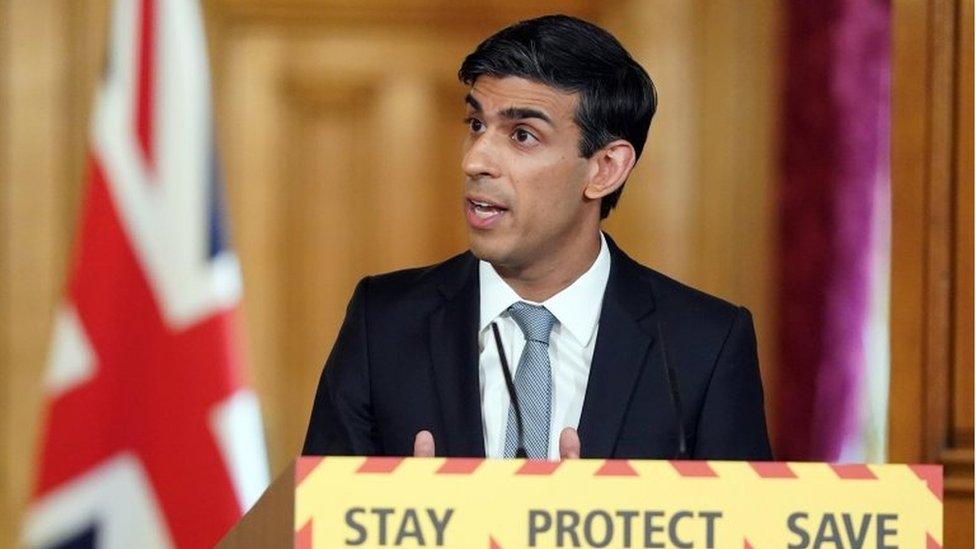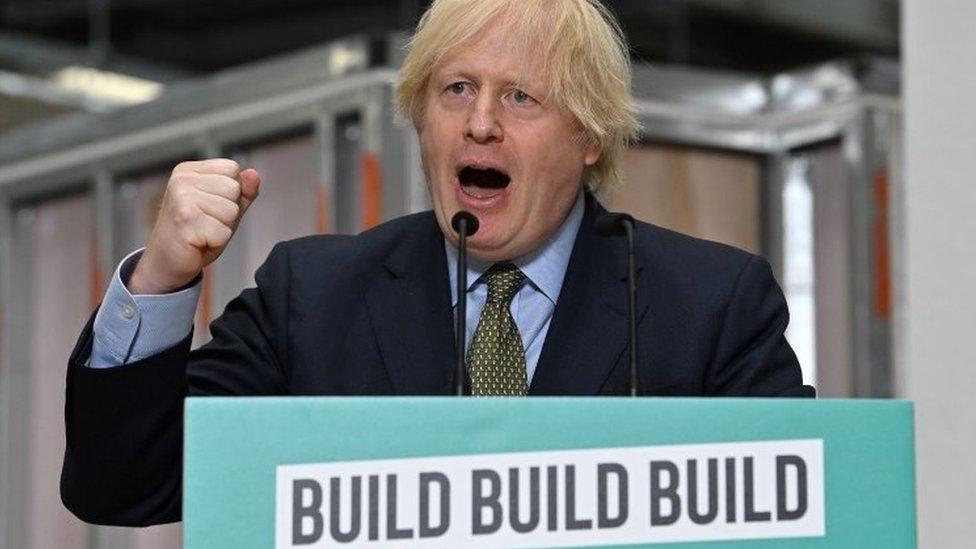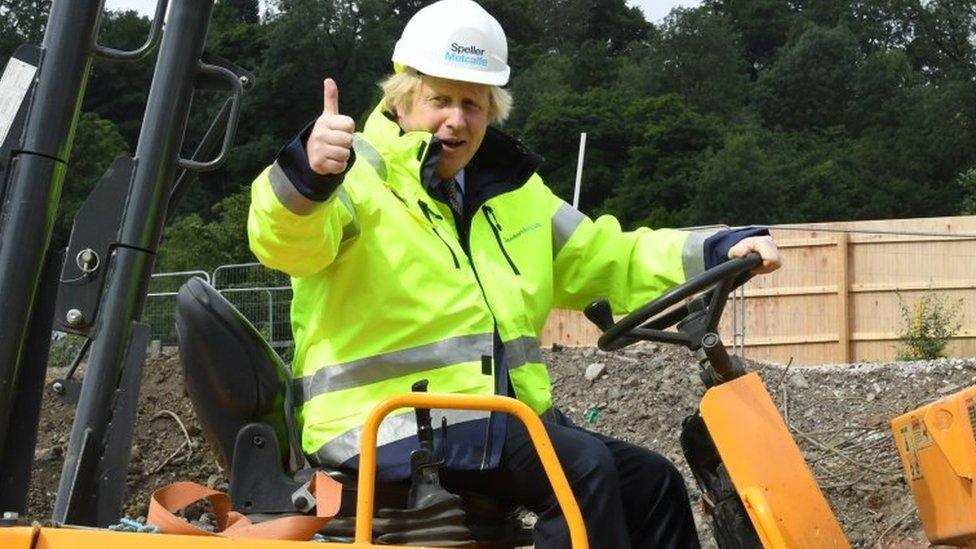Forget the hype - what did we learn from the PM's speech?
- Published

Forget the hype. What do we know now that we didn't know on Tuesday morning about the prime minister?
What extra light did his big speech in Dudley shed on what he plans for the country?
Since the coronavirus crisis and his own health battle, it's been rare to hear from him at length.
He did decide to share a moment with one of the newspapers, showing off press ups (don't ask), and he did pop up on Monday on the launch of a new radio station too.
But since his return to work after his own illness he has chosen not to say that much, focusing instead on the operational side of trying to grapple with the pandemic.
It's worth looking therefore at what he said today for clues of what might be next.
There were the usual Johnson calls for vigour - if only, he suggested, the "zap" or "psychic energy" of the country could be captured.
If only, it felt like he was saying, the country could see the glass as brimming half full in the way that he does too.
At a time like this, perhaps for some voters, a dose of cheer is what's required.
Perhaps for others, after the death toll, financial worry and disruption to daily life that sticks in the throat.
'Moment of crisis'
In policy terms, most of what he related was an acceleration of the Conservative manifesto.
'Build, build, build' another simple three word slogan, but one the prime minister's team could have written many months ago.
The main event to prevent enormous dole queues in the coming months, the government hopes, will come from the chancellor next week when specific support to sustain jobs is on the cards.
But the prime minister showed today he will use this profound moment of crisis as evidence to make again his long term case.
Government had been 'sluggish' sometimes responding to Covid 19, so change is required which matches his long-term desire to reform.
The country needs jobs, as we wait "hearts in our mouths" to feel the real impact of corona - a reason to bring in, he hopes his long promised "infrastructure revolution" faster than had been planned, promising high skilled jobs that could be created soon, even though critics point out that the jobs at risk right now are not a true match for the jobs that may well disappear.
Delay to reform and to the economy has been costly in so many ways he said, his desire to "get things done" on display.
And if that needs a massive national overdraft for many months, maybe years in the way that would give former Chancellor Philip Hammond nightmares, well fine.
If it also needs deregulation, in a way that would give the unions an allergy well fine too.
If, as we've seen this week, it means rattling the cage in Whitehall causing establishment palpitations, in his world that's worth the cost.

Chancellor Rishi Sunak is expected to make an announcement next week on measures to ease the impact of coronavirus
Boris Johnson showed again today that he is a politician who is willing to pick and mix - to borrow from the left, to intervene in the economy in a way that Tories traditionally shun.
But a leader who will also seek to tickle the belly of his party's traditional base by echoing frequent demands to phase out what he and many Tories see as the slow hand of the public sector.
Someone, wags might suggest, who wants to have their cake and eat it.
But a leader who made the case today that the moment requires a different kind of plan, that post-Covid politics should not be limited by the rules of the past.
Mr Johnson has always been a politician who enrages his opponents because he is hard to define.
A prime minister who has prospered with the electorate by reaching across traditional party lines. A pragmatist who just wants to get things done, his backers might suggest.
But his many critics allege that also means ignoring important principles if they stand in the way of being in charge.
But borrowing themes from both sides of the aisle is one thing. Delivering real support and change for the public every day, is much harder than making a rhetorical case.
Whatever was said at the lectern in Dudley today, whatever the chancellor says at the despatch box next week, this government will be judged on what they do and how they soften the impact of this historic crisis on millions of people's lives.
- Published30 June 2020

- Published30 June 2020

- Published12 June 2020

